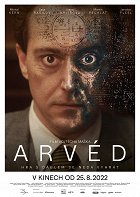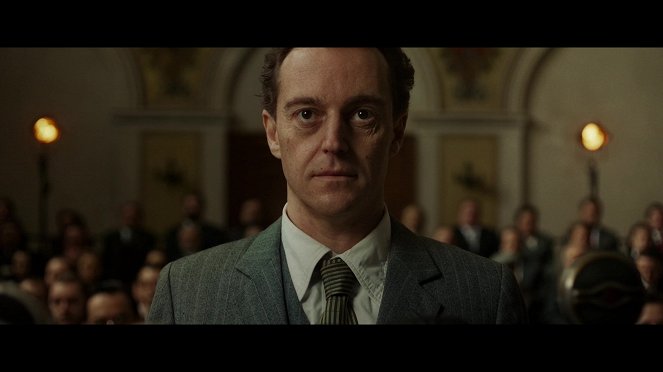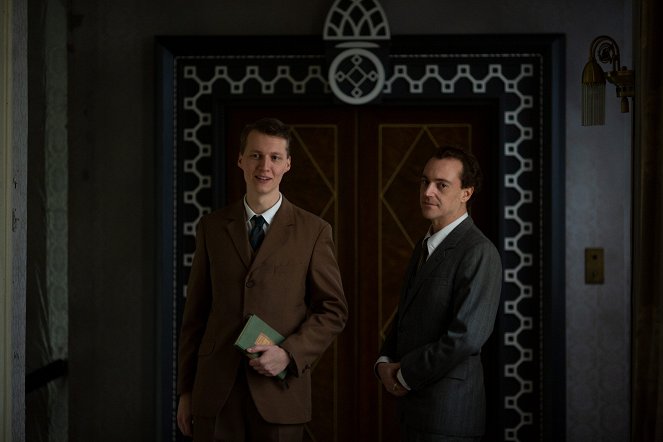Regie:
Vojtěch MašekKamera:
Dušan HusárBesetzung:
Michal Kern, Emanuel Fellmer, Saša Rašilov nejml., Vojtěch Vodochodský, Martin Pechlát, Vojtěch Vondráček, Tomáš Kobr, Václav Rašilov, Róbert Jakab (mehr)Inhalte(1)
Arved depicts the real life of controversial personality Jiří Arvéd Smíchovský, an occultist, incredibly intelligent man, Nazi collaborator and communist henchman. The film is a breath of fresh air in Czech period films, presenting a stylized, magical realism portrait of the main character as well as the 1940s and 1950s era. (Summer Film School)
(mehr)Videos (1)
Kritiken (4)
Ich würde jede andere Arbeit schätzen, die etwas Frisches in die Lethargie des tschechischen Films bringen kann, aber gerade Arved ist selbst lethargisch, wenn auch auf völlig andere Art und Weise. Es ist eine Kafka gestimmte Karussellfahrt, die dich am Ende völlig erschöpft ausspuckt - nicht durch beschriebene unangenehme Ereignisse, sondern durch seinen ermüdenden Stil und Rhythmus. Siebzig Minuten wären okay, zwei Stunden sind jedoch zerstörerisch.
()
Nach dem tragischen Jan Žižka musste ich meinen Geschmack mit einer rein künstlerischen Angelegenheit korrigieren, die sich definitiv nicht an Zuschauermassen richtet. Die theatermäßige Auffassung und Michal Kerns angemessen diabolische Darstellung bringen Arved an einen Ort, von dem viele Filme und ihre Macher im Jahr 2022 nur träumen können. Hier stimmt einfach alles - ein interessantes, aber kontroverses Thema, ein ehrlich, wenn auch kompliziert aufgestelltes Drehbuch und Theaterschauspieler - man braucht Theaterschauspieler dafür, sonst treten die großartigen Dialoge nicht hervor. Wenn Michal Kern nicht alle Preise erhielte, wäre das eine riesige Ungerechtigkeit. Mit dieser Leistung setzte er sich meilenweit von der Konkurrenz ab, die natürlich keineswegs schwach ist. In zweiter Linie muss ich Saša Rašilov hervorheben, mit welcher Eleganz und Lässigkeit er den wichtigsten Mitstreiter der Hauptfigur Arvéd präsentierte. Zu Pechlát und Plesl brauche ich nichts hinzuzufügen. Arved gehört eindeutig zu den besten tschechischen Produktionen des Jahres 2022. Eine letzte Bemerkung: Vojtěch Vodochodský und Vojtěch Vondráček treten immer häufiger gemeinsam in denselben Filmen auf, und ich glaube, dass viele Zuschauer sie aufgrund ihrer ähnlichen Physiognomie verwechseln könnten.
()
Arvéd is clearly an artistic-philosophical film. I know that because I was bored heavily for at least ninety minutes. The only things worth praising are some of the performances. Everything else was utterly beyond me (similarly to the repeatedly mentioned Kafka). I don't need things to be spelled out; I'm happy to reflect upon a film's message. On the other hand, I don't like movies that the filmmakers make just for themselves and a narrow audience. By a narrow audience, I mean only the viewers who actually liked the film and got something out of it. I don't include all those who rate it highly just because they try to appear as intellectuals and art lovers. I am on the exact opposite side of the barricade; the screenplay and direction failed to hypnotize me despite the relentless repetition of the same. I don't express enthusiasm when I don't feel it, and if I look ignorant in front of others because of it, I'm happy to take on that role because I'm completely indifferent to it. The film evoked emotions in me only when I realized that I had lost two hours of my life. / Lesson learned: You can tell a perfect informant by their ability to be useful under any regime.
()
Arved could be described as "Kafkaesque" for Arvedo, as the film radiated a pervasive absurdity and I was not at all sure what was reality and what was illusion. It was as if the ambiguous, contradictory and layered nature of Jiří Arvéd Smíchovský was projected on the screen. Vojtěch Mašek's film can certainly not escape comparison with the two years older Charlatan, which also tells the story of a controversial gay man from the (post-)war period. You could sense the film's ambition and attempt at innovative storytelling, but also a certain pomposity. Arved is no doubt a watchable film, and I was very impressed by the production design and lighting work, among other things, but it is somewhat unrewarding to the viewer and at times distant to the point of being cold – and too (pseudo)intellectual?.
()



Werbung